Proper disposal of electronic devices is a critical concern in today's technology-driven society, where the rapid development and constant updating of gadgets can lead to a considerable amount of electronic waste. Handling this effectively not only ensures environmental sustainability but also protects personal and business-related information from unwanted breaches. Sharing insights from real-life practices and expert guidance can illuminate the best methods for effectively managing the end-of-life phase of electronic products.

One of the primary recommendations from experts in electronic waste management involves the concept of recycling. Electronic devices often contain valuable materials such as gold, silver, copper, and platinum, as well as hazardous materials like lead, mercury, and cadmium. These materials can be harmful to the environment if not disposed of correctly. Recycling centers, which have grown in number and popularity, are equipped to safely extract these elements. Professional recyclers ensure that metals and other materials are recovered and reused, reducing the need to mine virgin resources. It is advisable to start by contacting local waste management authorities or certified e-waste recycling facilities to discover the best practices for electronic disposal in your area.
Donation is another viable option, particularly if the electronic devices are in working condition. Organizations such as schools, non-profits, and community centers may benefit from such contributions, enabling technology access for individuals who might not otherwise afford it. Before donating, ensure that all personal data is securely erased from devices. Numerous software tools are available to carry out secure data deletion, complying with standards like DoD 5220.22-M to prevent data recovery.

Manufacturers, recognizing their role in the life cycle of electronics, have increasingly embraced take-back programs, offering consumers the ability to return old devices for recycling or refurbishment. This initiative serves a dual purpose it reduces environmental waste and allows companies to reclaim and reuse valuable materials. Checking with the retailer or the manufacturer at the time of purchasing electronic devices can inform you about these return programs, often incentivized by discounts or product upgrades.
For businesses dealing with a large volume of electronics, partnering with specialized e-waste management companies can streamline disposal processes. These companies offer tailored solutions including bulk recycling, data destruction, and asset recovery services to ensure compliance with environmental regulations and data protection laws. Corporate clients can often benefit from detailed reporting and support, ensuring accountability and transparency in disposal processes.
how do you dispose of electronic devices
The secure disposal of data is an essential step in retiring electronic devices. Prior to recycling or donating, users must ensure that sensitive information is thoroughly removed. This involves more than just deleting files; hard drives and storage devices should be cleaned using secure erase tools. In cases where data security is a prime concern, like in financial or healthcare industries, physical destruction of storage media, such as hard drives, may be warranted. Professional data destruction services can provide certificates of destruction, guaranteeing that the data cannot be retrieved.
In addition to these strategies, staying informed about local laws and international guidelines on e-waste is crucial. Legislation regarding electronic waste management varies widely, impacting both consumers and businesses. Many countries are moving towards enforcing stricter rules, requiring producers to manage the collection and recycling of their products. By understanding and adhering to these regulatory requirements, both individuals and organizations contribute to a more sustainable and responsible technology ecosystem.
Finally, cultivating a habit of responsible consumption can mitigate the pressure on e-waste channels. Opting for durable devices, upgrading rather than replacing, and choosing brands with solid environmental commitments can significantly impact the volume of electronic waste generated.
In essence, while the disposal of electronic devices presents complexities, a combination of practical actions, informed decisions, and collaboration with responsible entities can lead to effective and eco-friendly outcomes. Maintaining such practices enhances not only our environmental stewardship but also sets a precedent for future technology innovation and sustainability.



